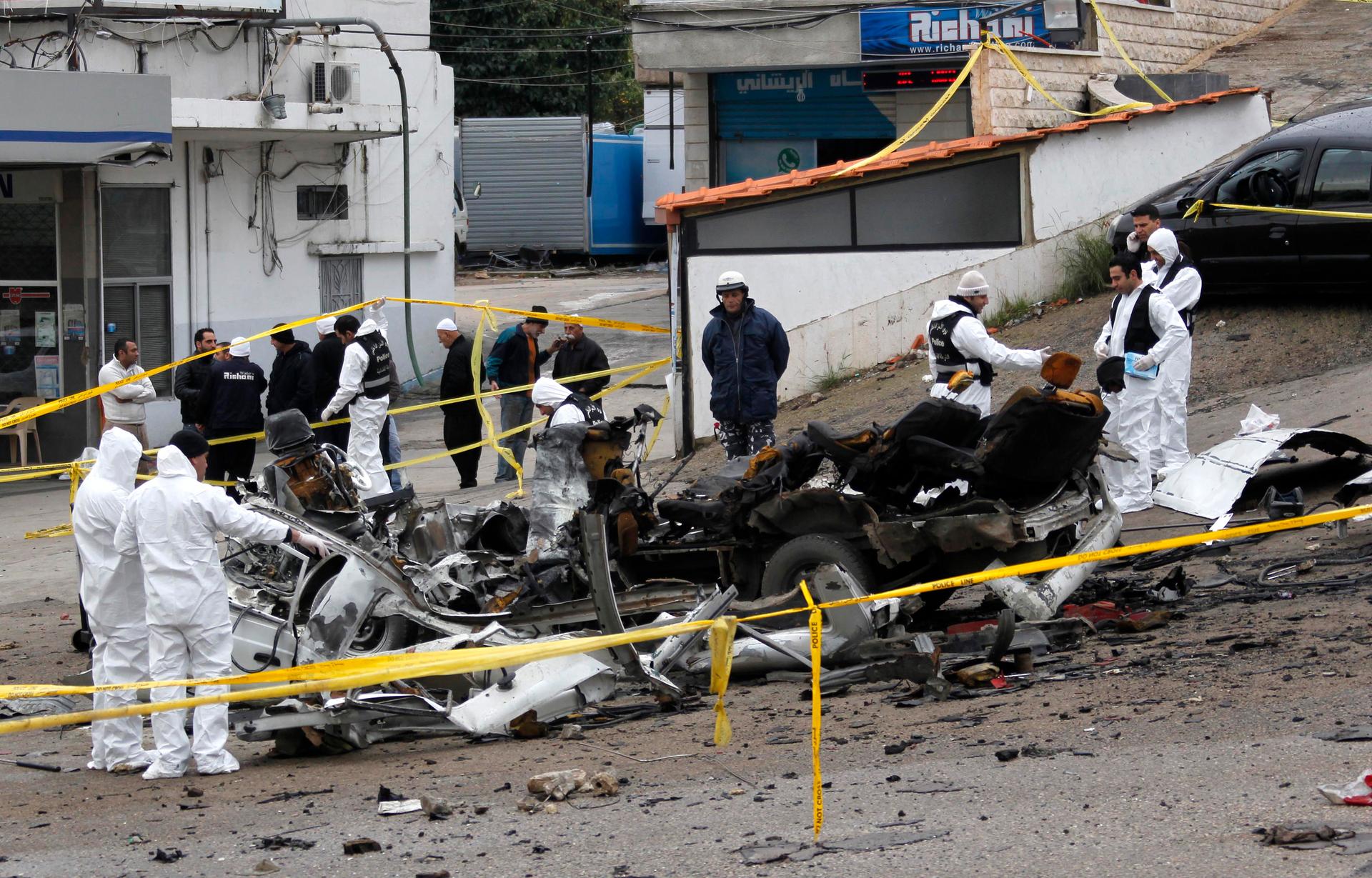If you live in a dangerous place, a new app from Lebanon can reassure your family
Forensic inspectors examine the wreckage of a van at the site of Monday’s explosion in Choueifat, a southern suburb of Lebanon’s capital Beirut on Monday, February 4, 2014.
Social media helps people stay in touch with friends and family around the world. In Lebanon, it has taken on a more urgent purpose.
26-year-old student Sandra Hassan launched the "I am still alive" app in January, in response to the worsening security situation. It sends an automatic tweet to your family to let them know you're OK after a bomb attack is reported. Hassan told the BBC she set it up as "an expression of frustration," not expecting that people would actually start using it.
However, there have been two bomb explosions since then, and the app has been downloaded more than 4000 times. There has even been demand from outside of Lebanon — from countries including Egypt and Pakistan — and an NGO has expressed an interest in using the app during natural disasters.
(Editor's note: The Global Scan can be delivered straight to your inbox every weekday. Just register and sign up today.)
India regains its Olympic status, and its athletes
India's Olympic athletes marched into the opening ceremony in Sochi under the Olympic flag. That's because they couldn't officially represent India, since the Indian Olympic Association had been barred from the games due to charges of corruption.
But Globalpost reports that today, the International Olympic Committee voted to lift the ban during the winter games. The reason: India got rid of its "tainted" leaders and elected World Squash Federation chief Narayna Ramachandran as its association president, ending the standoff. India's three athletes will be able to march under their own flag in the closing ceremony.
A French feminist film gives men a taste of sexual harassment
When French filmmaker Eléonore Pourriat released her film "Oppressed Majority" five years ago, it won an award in Ukraine, but gained little attention in her native France. A week ago, she uploaded it to YouTube, and now the English subtitled version has been viewed more than 2.3 million times.
It depicts a world in which women are the dominant gender. The protagonist is Pierre, an ordinary man. The 10-minute film shows the aggression and sexual harassment he is subjected to in the course of a day. Women walk around with bare chests, urinating in alleys, and asking him for sexual favors in the streets.
Why did Pourriat do this? She told the Guardian she was inspired to make the film when she realized that many men, even her husband, didn't understand the harassment many women experience on a daily basis.
Meet the girl biker gang of Marrakesh
They are the "Kesh Angels" and a New York photography exhibition is showing a side of Moroccan life that few have probably seen before. The hijab-wearing, girl bikers of Marrakesh are friends of photographer Hassan Hajjaj, who was born in Morocco and moved to Britain as a teenager. He’s been photographing his friends since the 1990s. PRI’s The World has photos and an explanation by Hajjaj about what it took to gain the trust of his subjects.
Canada just struck it rich, in fossils
Canadians have more to celebrate than mere medals at Sochi. One of the most important fossil sites in the world has been discovered in their country.
The new Marble Canyon fossil bed was found in Kootenay National Park, west of Calgary, by an expedition team from the Royal Ontario Museum. After just two weeks of work, researchers had unearthed thousands of specimens representing more than 50 animal species — including several that were previously unknown. It should help explain the dramatic growth in animal life during the Cambrian period. The exact location is being kept secret to protect the area. The website globalnews.ca says it is near Yoho National Park's 505-million-year-old Burgess Shale, a fossil field of major importance discovered a century ago.
If you walk away from a car accident, thank a cadaver
Spain is about to follow in the footsteps of the US and turn to cadavers to help make its crash testing more accurate — and its cars safer.
It turns out that crash dummies, while remarkably sophisticated, don't always reveal how the soft tissue in humans gets damaged during car crashes. The US first used cadavers to provide additional test information in 1939. Now Spain will start using them in tests, too, thanks to a loosening of restrictions in the European Union.
PRI's The World reports that Spain has the highest organ donation rate in the world, so researchers are confident that people will donate their bodies for research. It is tougher, they say, to get infant cadavers to test safety equipment like car seats.
What we're seeing on social
Weather around the world
The western US has been dry this winter — really dry. So dry, in fact, that many fear California, which exports billions of dollars of agricultural products into the international market, may have a very rough year growing food. But a storm over the weekend is being called a "game changer" — dropping 4.5 inches of rain on the important Sierra Nevada mountains. That much rain in such a short time usually causes flooding, but the water levels were so low, that wasn't the case, the Reno Gazette-Journal reports.
Every day, reporters and producers at The World are hard at work bringing you human-centered news from across the globe. But we can’t do it without you. We need your support to ensure we can continue this work for another year.
Make a gift today, and you’ll help us unlock a matching gift of $67,000!
